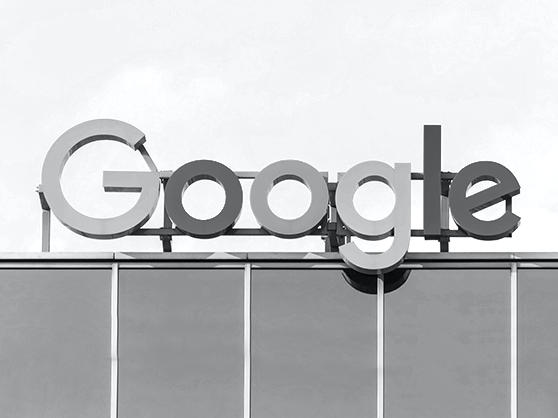In the digital age, customer management software has become an indispensable tool for contact centers worldwide. The right contact center CRM software can revolutionize how you connect with customers, transforming every interaction into an opportunity for growth. Whether it’s streamlining communication, tracking customer interactions, or deriving valuable insights from customer data, CRM brings immense value to contact centers.
This guide will review the top software and provide a detailed comparison to help you find the perfect fit for your business needs. Join us on this journey to elevate your customer service to unparalleled heights.
What is contact center CRM?
A Customer Relationship Management system (CRM) is a well-organized platform designed to improve customer interactions in a contact center. It simplifies communication by gathering all customer information in one place, making it easier for the service team to provide efficient and personalized assistance. This system includes features for managing contacts, monitoring customer interactions, studying customer data, and improving the overall customer experience.
When combined with call and contact center software, CRM becomes an essential tool. It gives service agents access to needed customer information during live chats, avoiding the need for customers to repeat details. The combination of CRM and contact center software can significantly improve the customer journey, increasing their satisfaction and loyalty and enhancing the performance of your customer service team.
Why do call centers need a CRM?
- Managing scattered customer information: In a busy call center, data can be scattered across different platforms. A CRM for call centers collects all customer information in one place, eliminating the hassle of hunting for details across multiple locations.
- Reducing tedious manual tasks: Repetitive tasks like data entry and record updates can interrupt an agent’s productive time. A call center software integrating with CRM automates these tasks, enabling agents to concentrate on providing exceptional customer service.
- Addressing disjointed customer interactions: Maintaining a comprehensive record of customer interactions can be challenging without a contact center CRM application. This system tracks all engagements, helping agents provide consistent service and enhancing the customer experience.
- Personalizing customer service: Without a CRM for call centers, providing personalized service can be challenging. With access to customer history and preferences, agents can tailor their interactions, improving customer satisfaction.
- Enhancing team collaboration: Team collaboration can suffer without a central data hub. A CRM system facilitates efficient sharing of customer information, ensuring all call center agents are on the same page.
- Improving decision-making with actionable insights: A contact center CRM application analyzes data and uncovers patterns and trends. These insights help managers make informed decisions about staffing, training, and improving processes.
Benefits of call center CRM software
1. Enriching the customer experience with improved first call resolution (FCR)
First impressions matter in customer service. With a call center CRM, agents can access a customer’s complete history at their fingertips, enabling them to respond to queries with heightened efficiency and precision. With all the required information, agents can often solve issues during the first interaction, significantly enhancing the customer experience and your call center’s operational efficiency.
2. Boosting agent productivity to new heights
In a call center’s dynamic environment, every minute counts. CRM call center software empowers your team by automating routine tasks such as data entry and record updates, liberating agents to concentrate on their core task – serving customers. With less time wasted on administrative chores, you’ll witness a substantial surge in agent productivity.
3. Fostering loyalty through superior customer retention
A CRM doesn’t just help manage customer interactions; it helps create meaningful connections. A CRM call center facilitates personalized interactions that deepen customer relationships by equipping agents with comprehensive customer profiles. The result is higher customer retention rates and a loyal customer base.
4. Efficiently cutting operational costs
One significant benefit of a CRM is its ability to streamline numerous processes within a call center. A CRM call program reduces operational costs by optimizing resource utilization and improving call handling efficiency, making your call center a cost-effective model.
5. Unleashing the power of enhanced reporting and analytics
A CRM goes beyond managing customer interactions – it’s a treasure trove of insights. Whether it’s customer behavior patterns, agent performance metrics, or call center operational trends, a CRM call center aids in strategic decision-making, helping you continually refine your customer service strategy.
6. Embracing growth with scalability
As your business thrives and expands, you need a system that can keep pace. CRM call center solutions are designed for scalability and readily adapt to increased call volumes and expanding customer data, ensuring your operations continue running smoothly no matter how much your business grows.
7. Updating your training routine
A CRM system in a call center serves as an invaluable tool for training and developing staff. New agents can learn quickly by observing real-time interactions and accessing historical data, leading to more effective onboarding and continuous professional development. By analyzing past interactions, agents can identify best practices and common pain points, enhancing their problem-solving skills and overall performance.
The list of top call center CRM
Let’s delve into some of the top call center CRM players in the arena:
- Salesforce Service Cloud: Comprehensive feature set and powerful call center CRM integrations.
- HubSpot: Easy & free contact center CRM.
- Freshdesk: Multichannel support and a game-like approach to customer service.
- Zoho Desk: Impressive blend of affordability and functionality.
- Apiway.ai: Pioneering in API integrations.
- Zendesk: Intuitive interface and robust ticketing system.
- Dixa: Superior multi-channel support.
- TalkDesk: Efficient self-service CRM tools for call centers.
- Bitrix24: Great for social media channels.
- Five9: Advanced AI capabilities.
How we evaluated the best contact center CRM
We employed a systematic approach to select the best call center CRM software. Our evaluation process focused on several key criteria, providing a comprehensive review to guide businesses in choosing the ideal solution. The criteria include:
- Cost-effectiveness: We examined each platform’s pricing structure, considering the base price and additional costs for extra features or services. This ensured we were recommending products that offer great value for the money.
- Core Features: We assessed each platform’s fundamental features, such as contact management, call handling, and ticketing capabilities. These are the essentials for any successful CRM.
- Expert Analysis: Our team of experts thoroughly examined each platform, keeping a keen eye on user experience, the learning curve, and overall system efficiency.
- Customer Support: We evaluated the quality of customer support, including response times, availability of support channels, and the helpfulness of the support teams.
- Specialized Capabilities: We took note of any unique or niche features that set the call center CRM platforms apart. These might include advanced analytics, AI capabilities, or specialized integrations.
Our goal was to ensure we presented the most balanced and comprehensive view of the best CRMs for call centers.
Best call center CRM solutions: Comparison
| CRM | Price | Key Features | Key Integrations |
|---|---|---|---|
| Salesforce Service Cloud | From $25/user/month | Comprehensive feature set, powerful integrations, AI capabilities | Google Workspace, Microsoft 365, Slack |
| HubSpot | Free (Paid plans, such as CRM Suite from $1,170/month for a team of 5 paid users) | Free CRM, Email marketing, Contact, and deal management | Gmail, Outlook, Slack, Zapier |
| Freshdesk | From $15/user/month | Multichannel support, Gamification, Self-service portal | Google Workspace, Slack, Microsoft 365, Zapier |
| Zoho Desk | From $7/user/month | Ticket management, Social media integration, AI capabilities | Google Workspace, Microsoft 365, Zapier |
| Apiway.ai | Free with ads, $9/user/month | API integrations, Data syncing | Google Workspace, Microsoft 365, Slack |
| Zendesk | From $19/user/month | Intuitive interface, Robust ticketing system, Multichannel support | Google Workspace, Microsoft 365, Slack, Zapier |
| Dixa | From $39/user/month | Multichannel support, Smart routing, Customer context | Google Workspace, Microsoft 365, Slack, Zapier |
| TalkDesk | From $85/user/month | Self-service tools, Intelligent routing, Analytics, and reporting | Google Workspace, Microsoft 365, Slack, Zapier |
| Bitrix24 | Has a free plan, paid plans start from $49/month (temporary offer, usually $61) | Social media integration, Task management, Live chat | Google Workspace, Microsoft 365, Slack |
| Five9 | From $119/team/month | AI capabilities, Omnichannel routing, Real-time analytics | Google Workspace, Microsoft 365, Slack, Zapier |
Please note that integration capabilities can vary depending on each call center CRM’s specific plans and configurations, so always verify these details with the CRM provider.
10 best CRMs for contact centers: Overview
1. Salesforce Service Cloud
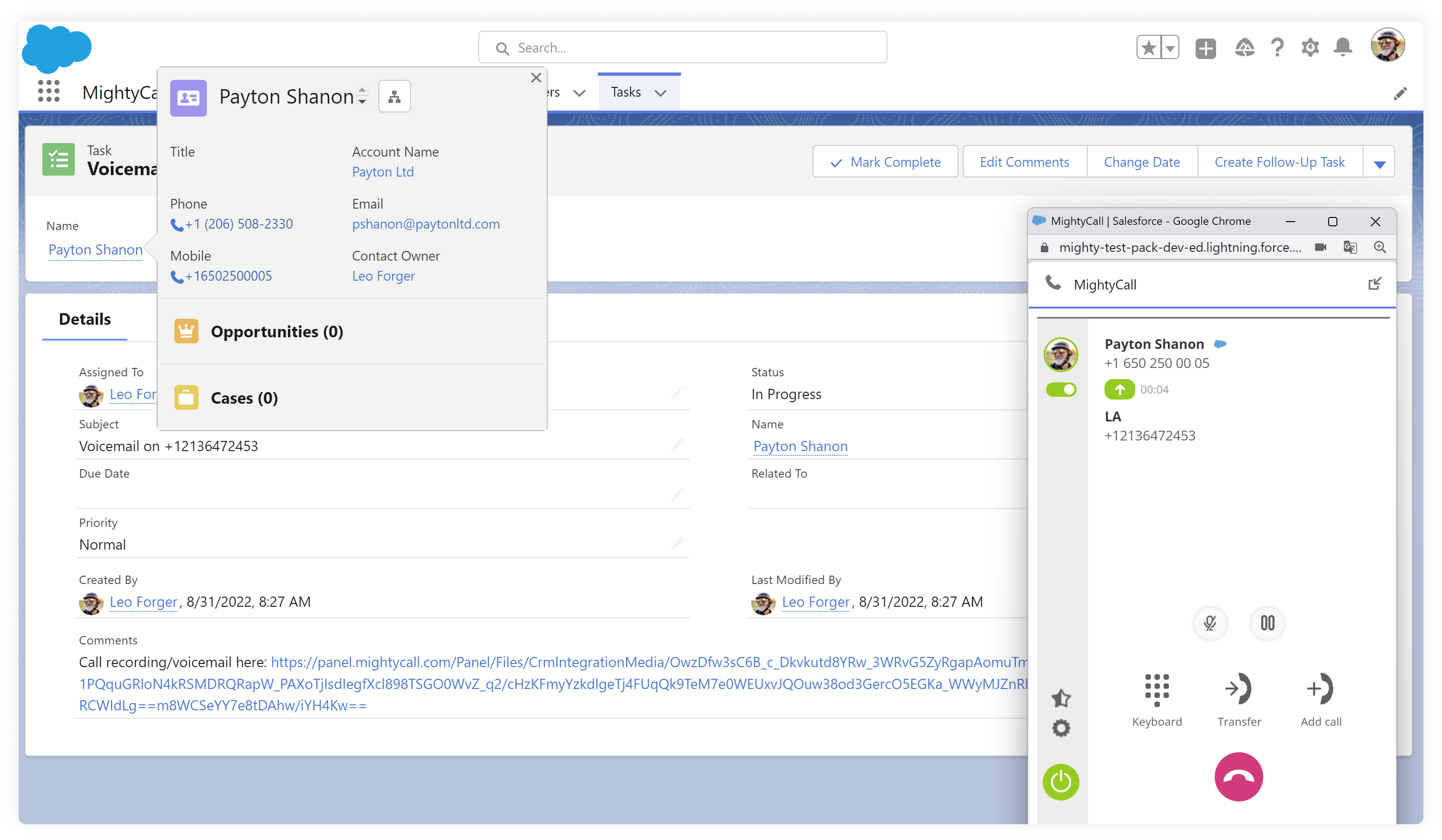
Salesforce Service Cloud is a high-performance Contact Center CRM renowned for its comprehensive features and robust integrations. It is an integral component of the broader Salesforce ecosystem and has been meticulously crafted to bolster customer service teams across various channels. Harnessing the power of cloud technology enables real-time, seamless communication, significantly enhancing responsiveness and customer satisfaction.
Their dynamic interface, designed for intuitive navigation, ensures all necessary information is readily available. This simplifies complex processes and enables agents to focus more on delivering top-notch customer service. Their commitment to service excellence and innovative technology makes it an industry leader, setting the benchmark in CRM for contact centers.
Best for: Businesses of all sizes that require extensive CRM functionality and strong integrations.
Price: Pricing starts at $25 per user/month.
Key Features:
- Case management: Track and manage customer inquiries and issues.
- Knowledge management: Access a centralized repository of solutions to common customer issues.
- Social customer service: Respond to customer queries on social media platforms.
- Advanced analytics: Leverage in-built analytics tools for performance monitoring and insight generation.
- Smart AI: Automate routine tasks and gain predictive insights.
- Scalability: Grow with your business, catering to an increasing volume of customer interactions.
Pros:
- Advanced AI capabilities
- Deep customization options
- Strong reporting and analytics
Cons:
- It can be expensive for smaller businesses
- It might have a steep learning curve for new users
User Reviews: 4.4 out of 5 on G2.
2. HubSpot
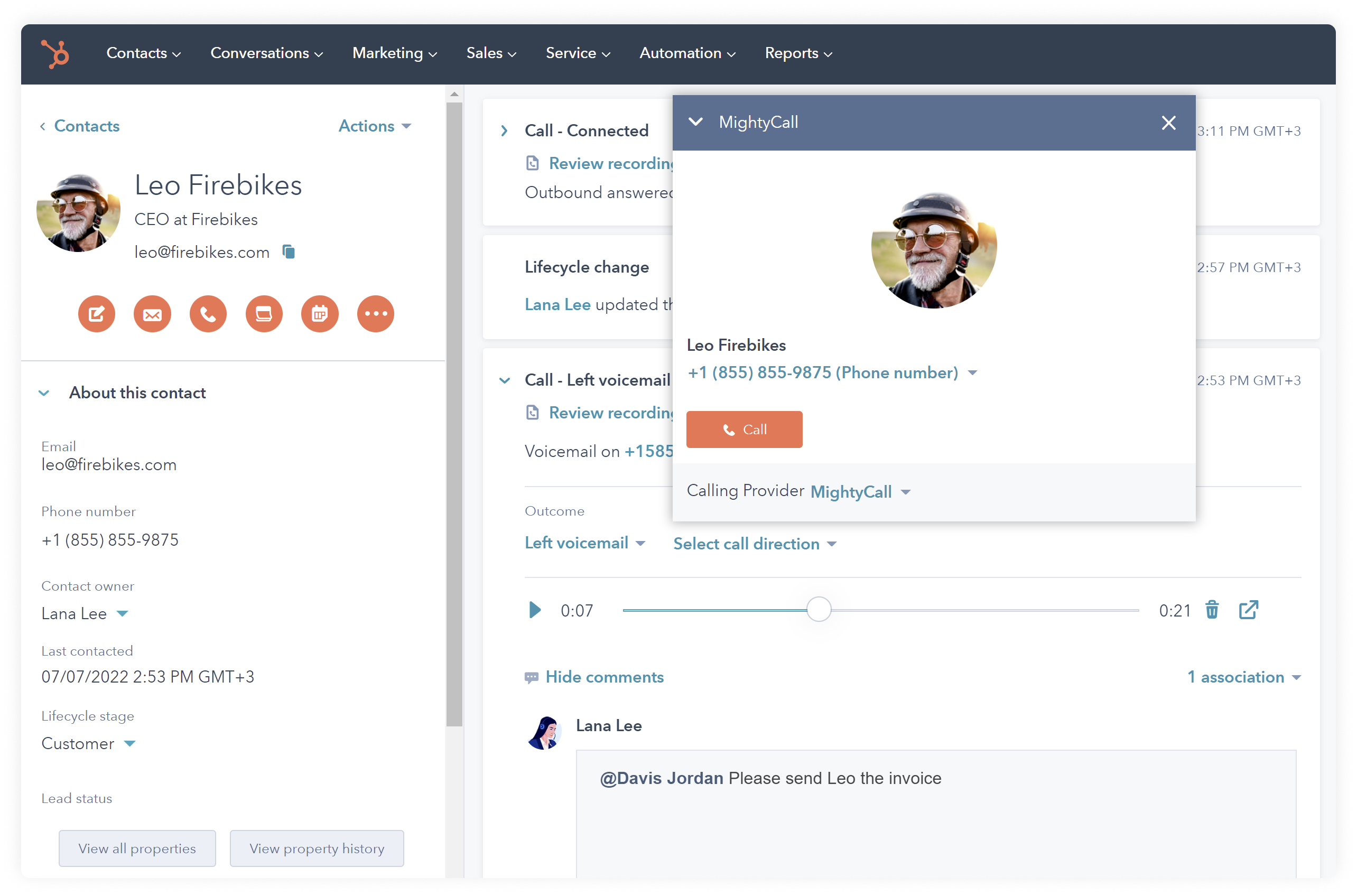
HubSpot is a leading name in the CRM call center software market. Renowned for its simplicity and comprehensive offerings, HubSpot’s CRM is an ideal choice for businesses of all sizes, from start-ups finding their footing to established enterprises seeking to streamline their operations. Its seamless blend of usability and functionality makes it a powerful tool for managing customer relationships.
What sets HubSpot apart is its generous free offering. Particularly beneficial for start-ups and small businesses, the free call center CRM for business provides essential features and capabilities. This enables young companies to enhance their customer service without additional costs. With HubSpot, companies can take the first step towards efficient customer management, setting a strong foundation for future growth.
Best for: This is a call center CRM for small businesses and startups looking for a cost-effective solution
Price: Free (Paid plans, such as CRM Suite from $1,170/month for a team of 5 paid users)
Key features:
- Full view of the sales pipeline: Helps in managing the sales process effectively and efficiently.
- Email tracking: Allows businesses to monitor opened or unopened emails and gauge customer engagement.
- Prospect tracking: Enables tracking of customer interaction history, aiding in personalized service delivery.
Key Integrations:
- Gmail
- Outlook
- Slack
- Zapier
Pros:
- Free plan offers substantial functionality
- User-friendly interface
- Strong marketing tools
Cons:
- Advanced features require a paid plan
- Limited customization options
User Reviews: 4.4 out of 5 on G2.
3. Freshdesk
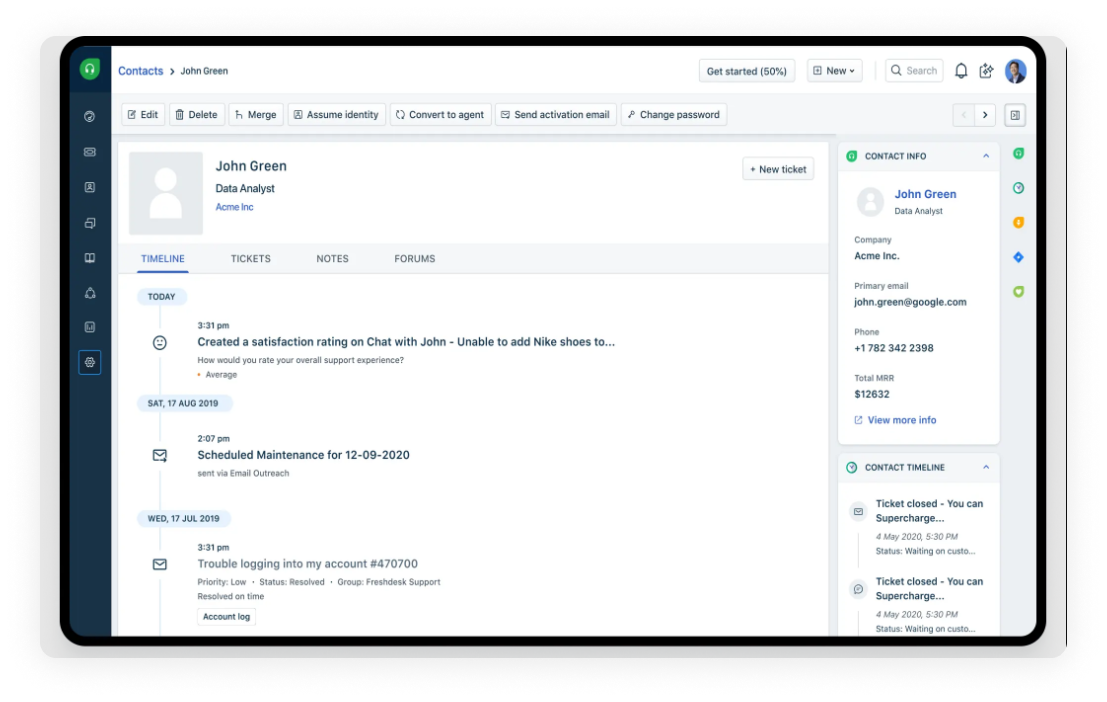
Freshdesk is a contact center CRM software solution that brings a refreshing, gamified approach to the often-pressured realm of customer service. This innovative platform incorporates play elements into its system, turning routine tasks into engaging activities. As such, Freshdesk makes the process more enjoyable for service agents and contributes to productivity and morale.
In addition to their unique gamification, Freshdesk is celebrated for its rich multichannel support. Consolidating interactions across various channels into a single platform simplifies customer service management. Combined with a suite of user-friendly features, the Freshdesk CRM solution for contact centers empowers businesses to streamline their operations and elevate their customer service experience.
Best for: Businesses seeking to enhance customer support with gamification
Price: From $15/user/month
Key Features:
- Multichannel support: Enables customer interactions across different channels, including email, phone, chat, and social media.
- Gamification: Gamified metrics and leaderboards promote healthy competition among customer service reps, enhancing productivity.
- Smart automations: Automates repetitive tasks, letting agents focus more on customer interactions.
Key Integrations:
- Google Workspace
- Slack
- Microsoft 365
- Zapier
Pros:
- Gamification features boost agent productivity
- Easy to set up and use
- Excellent customer support
Cons:
- Reporting could be more customizable
- High-tier features can be pricey
User Reviews: 4.4 out of 5 on G2.
4. Zoho Desk
Zoho Desk represents a harmonious blend of affordability and functionality, making it an appealing CRM solution for budget-conscious businesses. Its economical pricing structure does not compromise on the quality or variety of its call center CRM features, allowing businesses to benefit from a comprehensive suite of CRM tools without straining their finances.
Noteworthy for its capabilities, Zoho Desk is particularly suitable for businesses that require robust Contact Center CRM functionality at an accessible cost. By facilitating efficient customer interaction management, data collection, and analytics, it offers excellent value for money, making CRM deployment feasible and beneficial even for smaller businesses.
Best for: Small to midsize businesses seeking affordability without sacrificing functionality
Price: From $7/user/month
Key Features:
- Ticket management: Helps manage customer tickets efficiently, providing timely responses.
- Multi-department support: Enables seamless collaboration between different departments, aiding in issue resolution.
- AI-powered assistance: Assists with customer queries, providing quick, automated solutions.
Key Integrations:
- Google Workspace
- Microsoft 365
- Zapier
Pros:
- Affordable pricing structure
- Easy to use with a clean interface
- Solid customer support
Cons:
- Limited customization options
- Certain features require a learning curve
User Reviews: 4.4 out of 5 on G2.
5. Apiway.ai
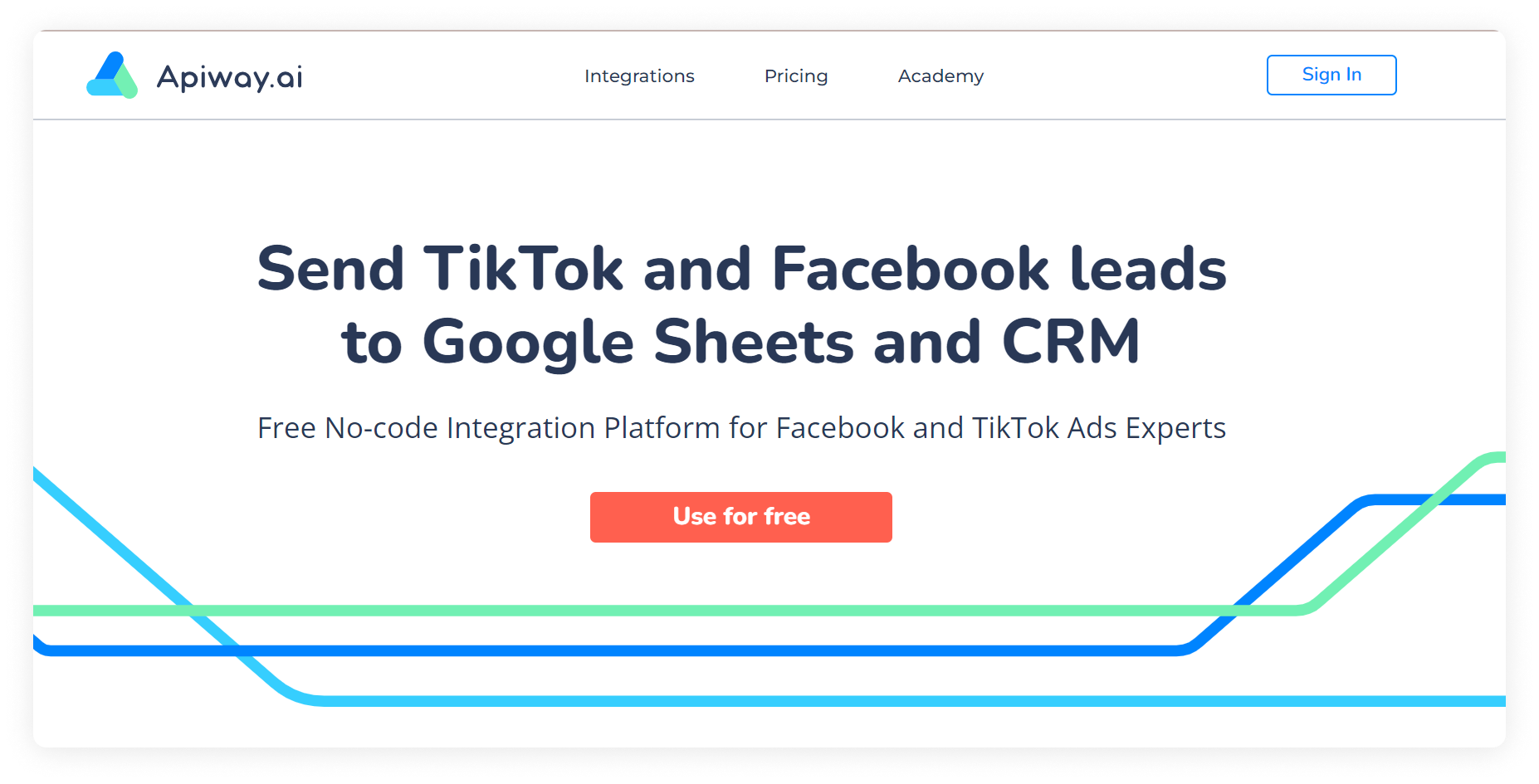
Apiway.ai is a distinctive player in the call center CRM software market, focusing on free API integrations. This feature-rich tool is pioneering in that it empowers businesses to automate their processes and establish seamless communication between various software applications.
The automation capabilities offered by Apiway.ai improve operational efficiency and allow for significant time savings. By eliminating manual data entry and facilitating automated workflow, this CRM software allows businesses to channel their resources into more strategic areas, thereby driving productivity and growth.
Best for: Small to medium-sized businesses looking for easy CRM integration and process automation
Price: Free with ads, from $9/user/month for premium
Key Features:
- Robust API integrations: Allows businesses to integrate with various applications, improving process efficiency.
- Automation: Helps automate repetitive tasks, boosting agent productivity.
- Task management: Enables efficient task tracking and management, enhancing overall operational efficiency.
- User-friendly interface
Key Integrations:
- HubSpot
- Gmail
- Mailchimp
Pros:
- Great for automating workflows
- Easy to use
- Wide range of integrations
Cons:
- Might lack some advanced features
- Newer in the market
User Reviews: 4.6 out of 5 on G2.
6. Zendesk
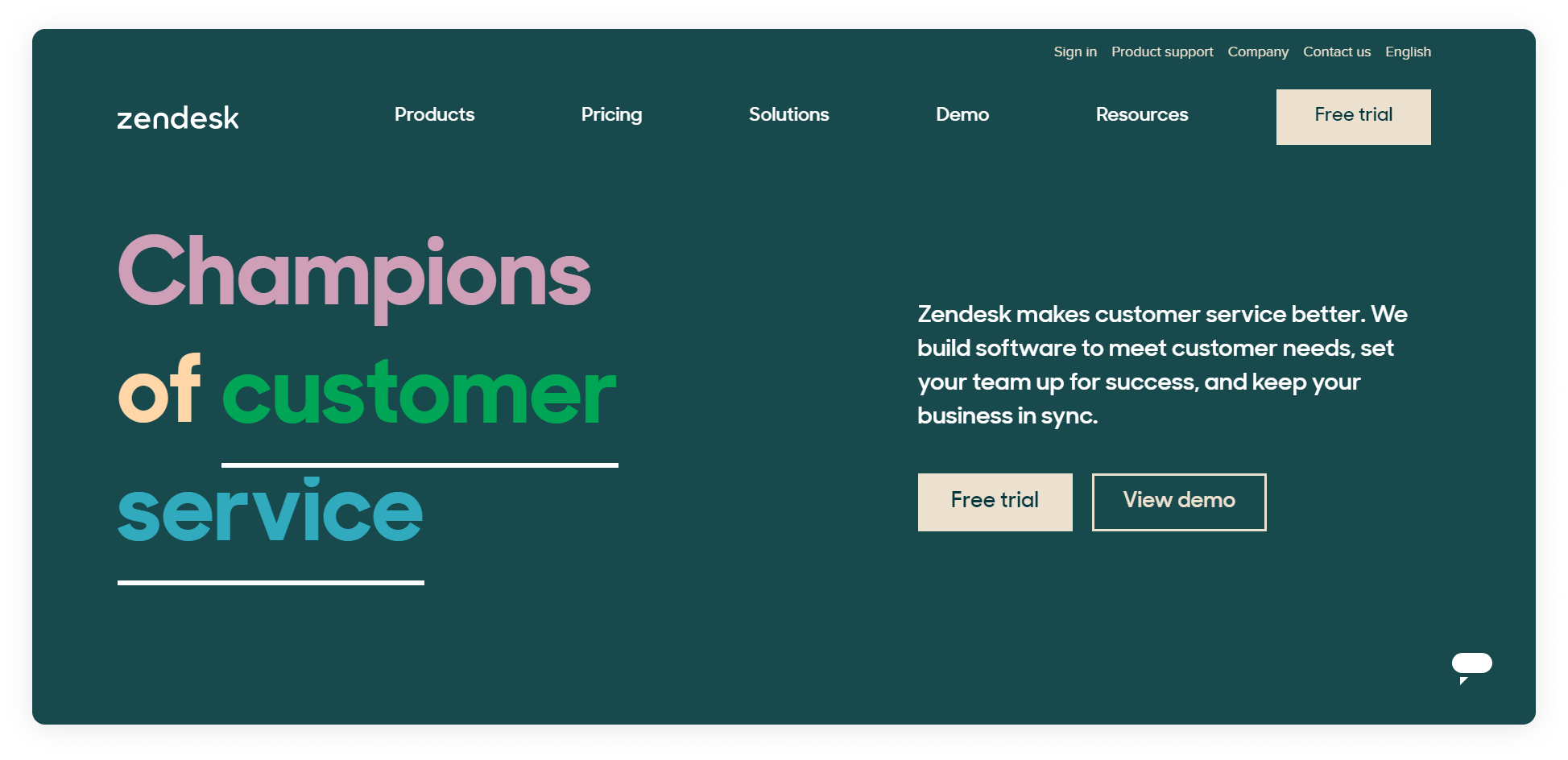
Zendesk is a prominent CRM player that is distinguished by its intuitive user interface and robust ticketing system. The call center software is developed to improve customer service operations, offering agents an easy-to-navigate platform that significantly simplifies their workflow.
Apart from its user-friendly design, Zendesk also shines in its commitment to efficient problem resolution and enhanced customer engagement. Its solid ticketing system effectively tracks and manages customer inquiries, resulting in quicker resolution times. This emphasis on streamlined communication directly translates into happier customers and more productive customer service teams.
Best for: Medium to large businesses seeking robust ticketing and customer service features
Price: From $19/user/month
Key Features:
- Robust ticketing system: Helps manage customer tickets efficiently, ensuring timely responses.
- Multichannel support: Allows customer interactions through various channels, including email, phone, chat, and social media.
- Knowledge base: Provides a self-service option for customers, reducing agent workload.
- In-depth analytics and reporting
Key Integrations:
- Slack
- Microsoft 365
- Google Workspace
Pros:
- User-friendly interface
- Powerful ticket management
- Excellent customer support
Cons:
- Advanced call center CRM features may require a steep learning curve
- Higher cost for premium plans
User Reviews: 4.3 out of 5 on G2.
7. Dixa
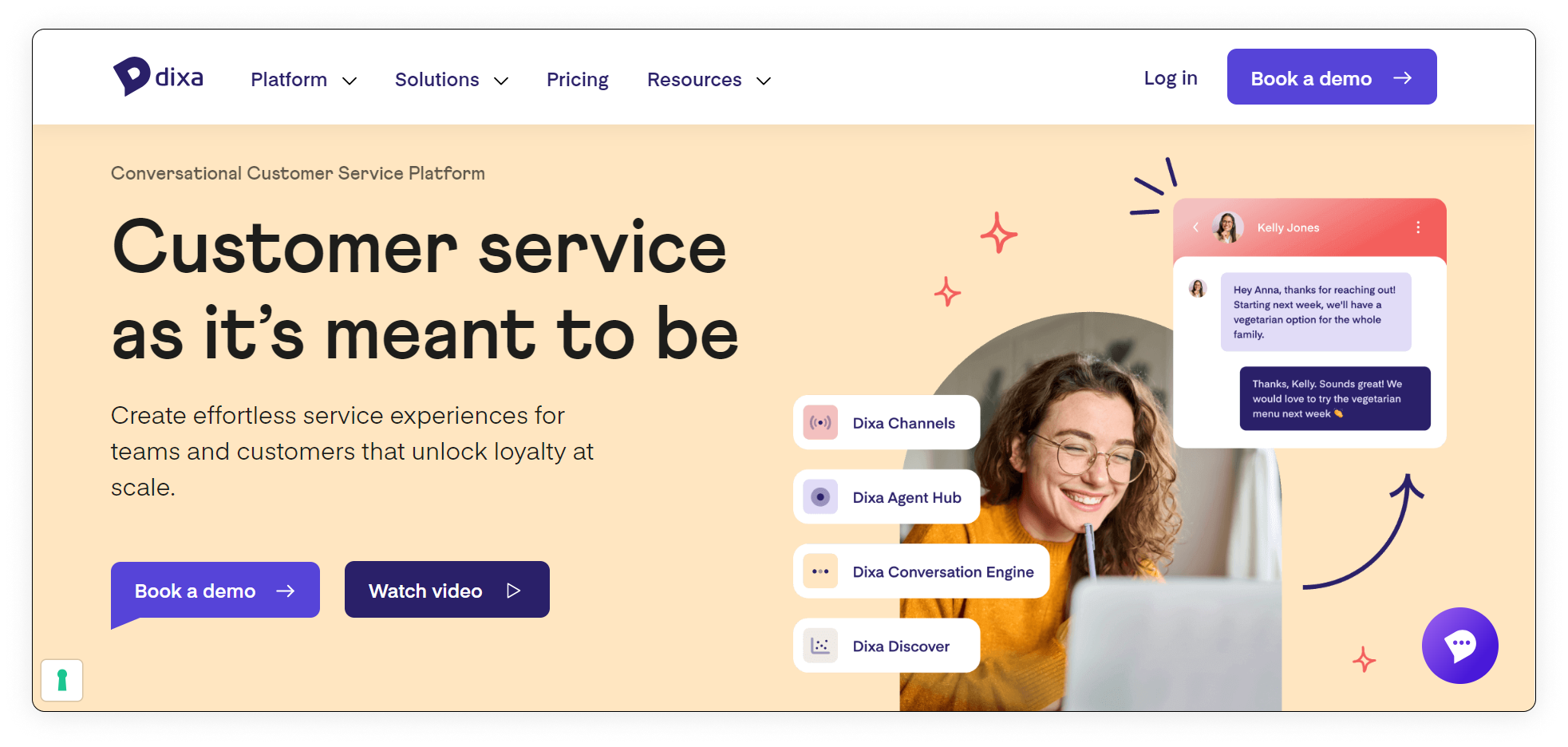
Dixa is a B2B sales and communication customer service platform renowned for its superior multi-channel support. It is a comprehensive tool that cleverly integrates various communication channels into a unified interface, such as email, chat, messaging, and phone calls. This enables businesses to manage and monitor customer interactions seamlessly across different platforms.
Dixa’s greatest strength is its ability to facilitate personalized customer experiences. Centralizing communication channels gives agents a more specific view of the customer, enabling more tailored and responsive interactions. This capability makes Dixa an ideal solution for companies aiming to enhance their customer engagement.
Best for: Businesses looking to consolidate customer communication channels
Price: From $39/user/month
Key Features:
- Multichannel support: Offers unified customer interactions across different platforms.
- Customer insight: Provides comprehensive customer profiles, aiding personalized service delivery.
- Routing: Ensures customer queries are routed to the most suitable agent, improving resolution time.
- Customer recognition across channels
Key Integrations:
- Zapier
- Shopify
- Magento
Pros:
- Consolidates all customer communications in one place
- Excellent multi-channel support
- User-friendly interface
Cons:
- Pricing information isn’t readily available
- Limited third-party integrations
User Reviews: 4.2 out of 5 on G2.
8. TalkDesk
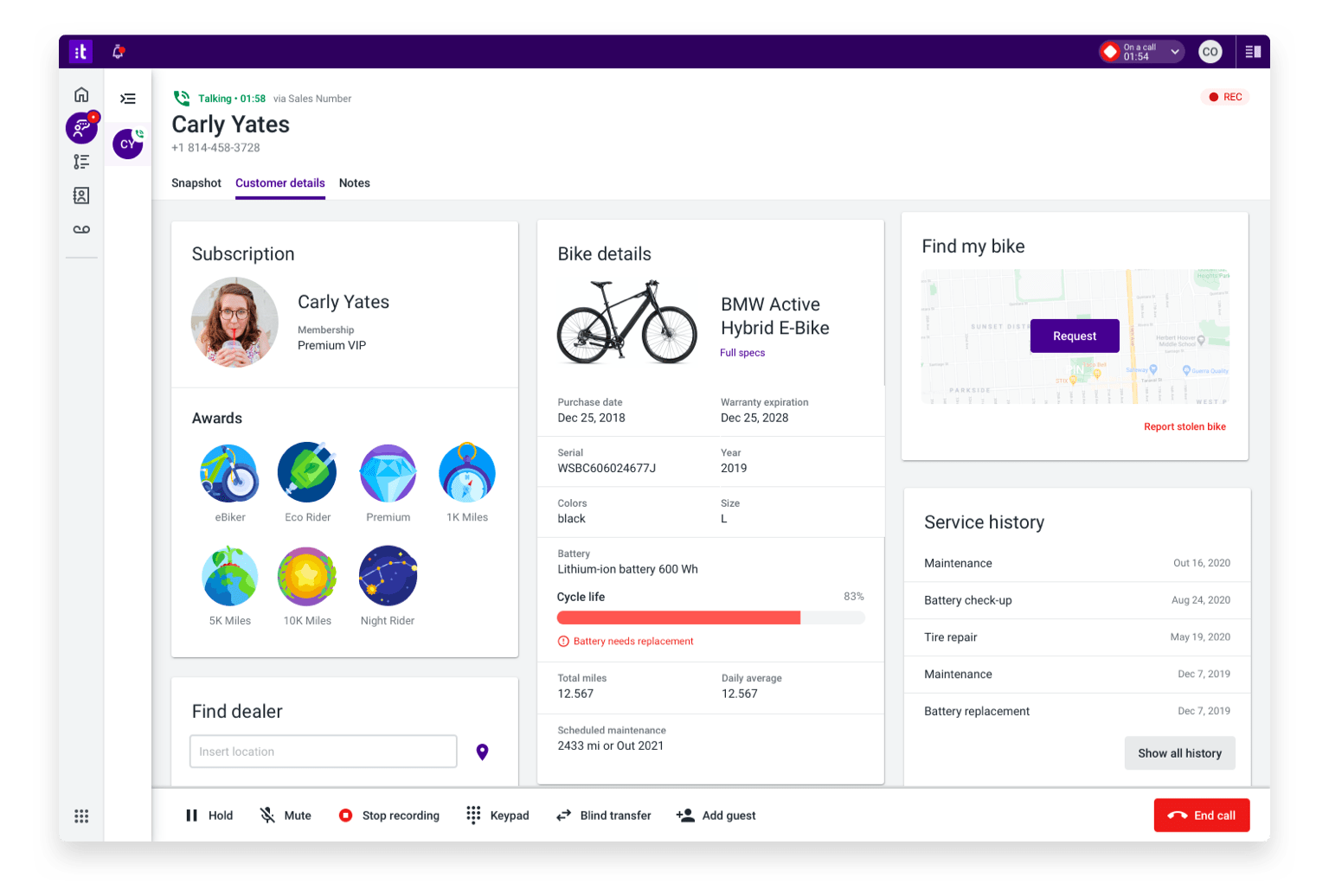
TalkDesk is a unique CRM platform that sets itself apart with its efficient self-service tools. These tools empower customers to find solutions to their problems quickly and independently. By providing customers with this autonomy, TalkDesk reduces the reliance on live agents for problem-solving.
Beyond customer empowerment, TalkDesk significantly enhances customer experience. It achieves this by promoting faster issue resolution and increasing customer satisfaction. Additionally, by helping reduce the load on customer service agents, TalkDesk also enables agents to focus on more complex inquiries, thus optimizing overall operational efficiency.
Best for: Businesses aiming to improve customer self-service
Price: From $85/user/month
Key Features:
- Self-service tools: Reduces agent workload by enabling customers to find solutions to their queries.
- Omnichannel support: Offers seamless customer interactions across various channels.
- Agent performance reporting: Helps monitor agent performance, ensuring efficient customer service delivery.
- Call recording and quality management
Key Integrations:
- Slack
- Salesforce
- Zendesk
Pros:
- Powerful self-service tools
- Easy to set up and use
- Great customer support
Cons:
- Reporting functionality could be improved
- On the pricey side for small businesses
User Reviews: 4.4 out of 5 on G2.
9. Bitrix24
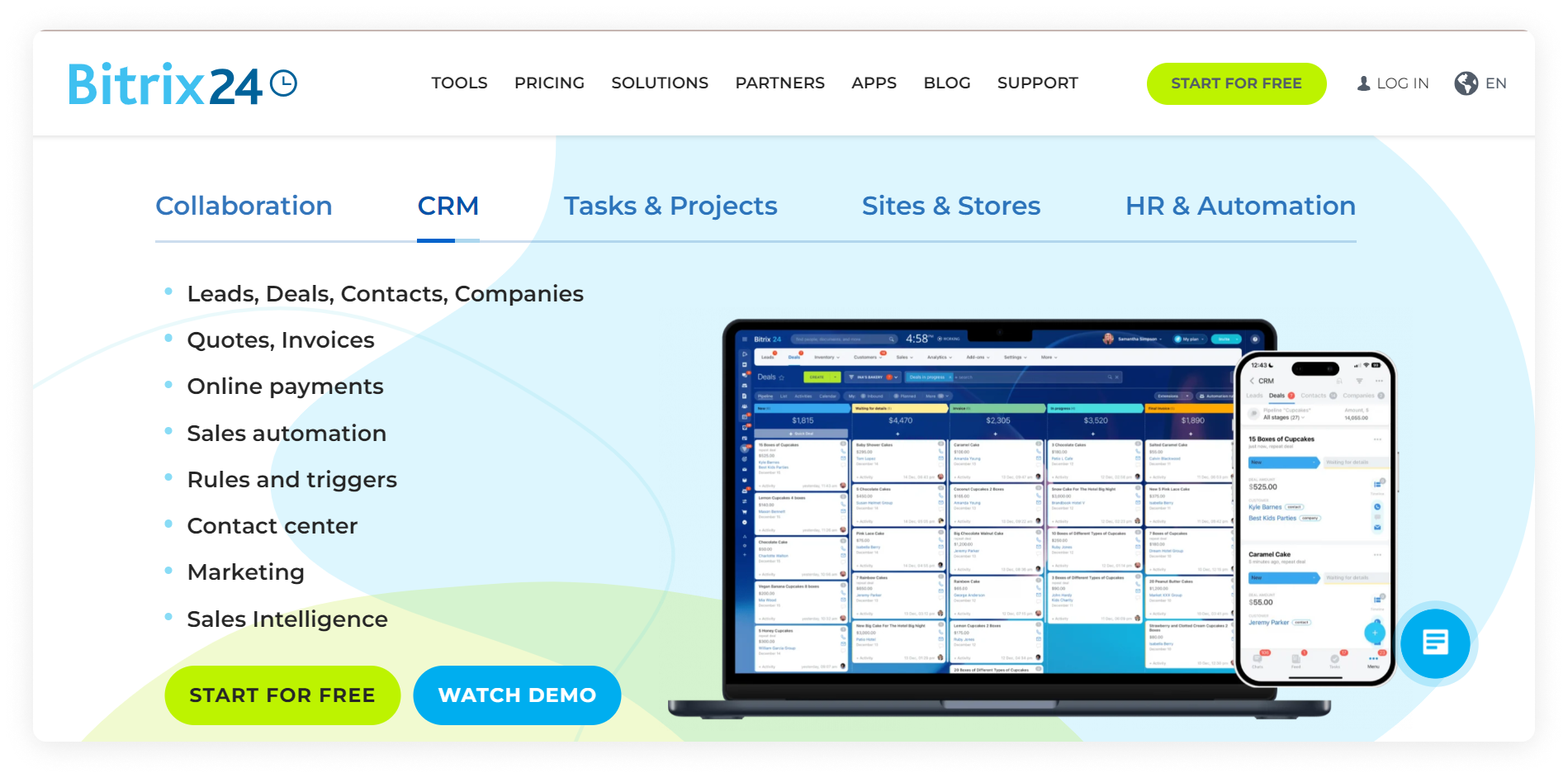
Bitrix24 stands out among the best call center CRM software for its extensive integration capabilities, especially with social media channels. This unique attribute enables businesses to effortlessly manage customer interactions across multiple social platforms, thereby providing a unified customer experience.
Bitrix24 is an invaluable tool for businesses prioritizing active engagement on social platforms. It provides the means to maintain consistent and effective communication, fostering better customer relationships. The platform also supports businesses in capturing valuable customer feedback, thus paving the way for continuous improvement in service delivery.
Best for: Businesses looking to manage customer interactions through social media
Price: Has a free plan, paid plans start from $49/month (temporary offer, usually $61)
Key Features:
- Social media integration: Enables efficient management of customer interactions across various social platforms.
- Task management: Helps track and manage tasks efficiently, improving productivity.
- Contact management: Allows organization and tracking of all customer contacts in one place.
- Telephony and live chat
Key Integrations:
- Google Workspace
- Microsoft 365
- Mailchimp
Pros:
- Extensive social media channel support
- Wide array of features
- Free version available with basic features
Cons:
- Can be complex to use initially
- Advanced features require paid plans
User Reviews: 4.1 out of 5 on G2.
10. Five9
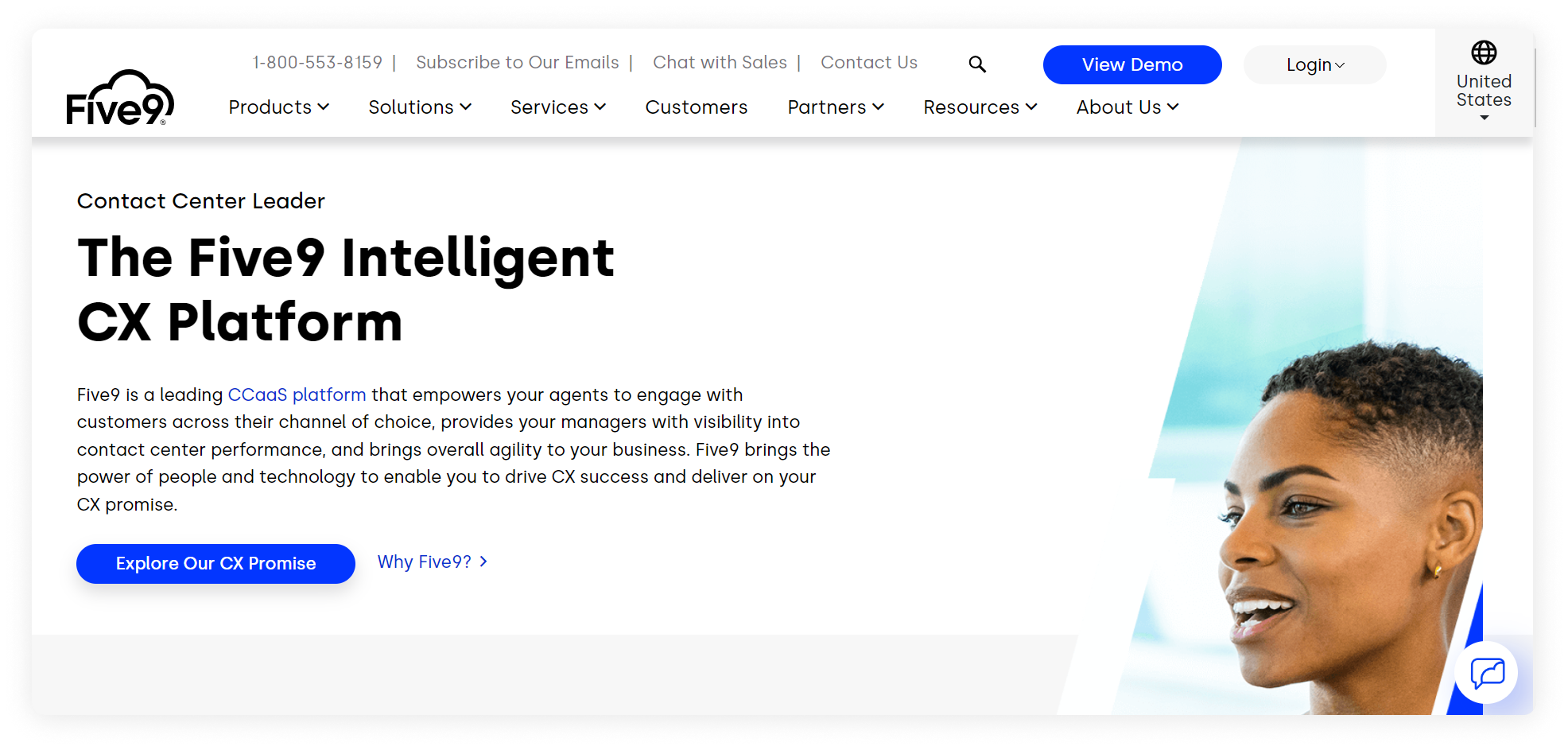
Five9 has established itself as a leading provider of call center CRM solutions. Renowned for its robust and versatile functionality, it caters to diverse business needs, making it a reliable choice for companies with hotlines of all sizes.
Another distinguishing feature of the platform is its scalability. As your business grows and customer interactions increase, Five9 can adapt and expand to meet the evolving demands. This makes it a dependable partner for businesses aiming for growth, ensuring that their customer service needs will continue to be met even as they expand.
Best for: Businesses of all sizes looking for scalable cloud-based contact center software
Price: From $119/team/month
Key Features:
- Scalability: Adapts to increased call volumes and customer data, ensuring efficient operations during business growth.
- Omnichannel routing: Enables seamless customer interactions through various channels.
- AI-powered assistance: Provides automated solutions for customer queries, improving resolution time.
- IVR with speech recognition
Key Integrations:
- Salesforce
- Zendesk
- Microsoft Teams
Pros:
- Highly scalable solution
- Strong omnichannel capabilities
- Reliable cloud-based infrastructure
Cons:
- Pricing is not transparent
- Learning curve for some features
User Reviews: 4.0 out of 5 on G2.
How to choose a CRM for a call center?
When it comes to getting CRM software for a call center, there are several critical factors you need to consider. Here are our top six recommendations:
1. Understand your business needs: Before browsing the multitude of CRM options, you need to grasp your business needs. Determine what problems you seek to resolve with the call center CRM system and match these with the capabilities of potential CRM solutions.
2. Consider the user interface: Opt for a CRM with a user-friendly interface. Your team will use this software daily, so a convoluted, non-intuitive interface can hinder productivity.
3. Check out CRM integration capabilities: The CRM you choose should seamlessly integrate with your current systems, such as email, telephony, or ERP systems. The correct CRM will enhance your existing infrastructure, not complicate it.
4. Look for customization options: Every business has its unique needs. A quality contact center CRM should provide customization options that allow you to tailor it according to your specific business needs.
5. Double-check the vendor’s customer support: Make sure to examine the vendor’s customer support services. You want to ensure that a knowledgeable and responsive support team is available in case of any issues or queries with your call CRM.
6. Evaluate the pricing: While it’s crucial to find a call center CRM software that meets your needs, pricing is an equally important aspect. Seek a CRM that offers a balance between cost and features, ensuring it fits within your budget. Remember, the most expensive CRM may not necessarily be the best for your business.
Features to look for in a contact center CRM software
In an increasingly competitive business landscape, selecting the right CRM system for your contact center can make all the difference. With a myriad of offerings in the market, it is crucial to identify and prioritize key features that align with your business needs. Here are eight indispensable features you should consider when choosing your CRM:
1. Customer interaction tracking
A fundamental aspect of call center CRM solutions is their ability to track all customer interactions. This extends beyond phone calls and encompasses emails, social media engagements, live chats, and other forms of communication. This comprehensive overview empowers your agents with crucial context and understanding of customer issues and requirements, enabling them to provide better service.
2. Integration capabilities
Your chosen call center CRM software should seamlessly integrate with your business’s existing systems and software, including telephony systems, email platforms, social media channels, and more. Effective integration promotes smooth workflows and enhances productivity, removing redundant tasks and fostering a unified system.
3. Real-time analytics and reporting
Insights derived from customer interactions are a valuable project management tool for shaping your business strategy. Hence, your call center software should offer real-time analytics and comprehensive reporting capabilities. With access to current and accurate data, you can make informed decisions that can elevate your service delivery and customer satisfaction.
4. Contact management
The ability to organize, track, and manage all customer contacts effectively is a cornerstone feature for any call center CRM system. This centralization of customer data facilitates efficient information retrieval, promoting more personalized and effective customer interactions.
5. Multichannel support
Today’s customers engage with businesses through a variety of channels, from social media to emails and phone calls. A versatile call center CRM software should provide multichannel support, enabling your agents to manage customer interactions across different platforms from a unified interface. This ensures a consistent and seamless customer experience, regardless of the communication channel.
6. Automation
CRM software should assist in automating routine tasks such as data entry, follow-ups, and sending notifications. Automation not only increases efficiency but also reduces the likelihood of human error. By automating mundane tasks, your agents can devote more time to delivering quality customer service.
7. Customization
Every business is unique, with distinct operational requirements. Thus, your call center CRM application should be flexible and allow customization of features, workflows, and interfaces to cater to your specific needs. A CRM that can adapt to your business is more likely to offer long-term value.
8. Call recording
As your business grows, so does the complexity and volume of customer interactions and helpline call loads. Your CRM system should be capable of storing the conversations with your clients, accommodating increasing customer data, and providing continued, efficient service. Call recording ensures your investment is future-proof, improving call management and maintaining all the information at your fingertips as your business expands.
By focusing on these crucial features, you can select the best CRM for your call center that will align with your business objectives and propel your customer service to new heights.
Getting CRM software for a call center is key to success
CRM software for call centers is more than just a tool; it’s a strategic investment that can potentially transform your business’s operations. It significantly boosts efficiency and allows your team to manage customer interactions effectively. Moreover, with enhanced process automation and data organization, your team can focus more on meaningful, value-added tasks, creating a more productive work environment.
Furthermore, the right contact center CRM system offers a comprehensive, 360-degree view of your customers. This holistic perspective fosters personalized service, which is key in today’s customer-centric business environment. Enhanced customer satisfaction and loyalty are direct outcomes of such personalized attention, setting your business on a path towards greater heights.








